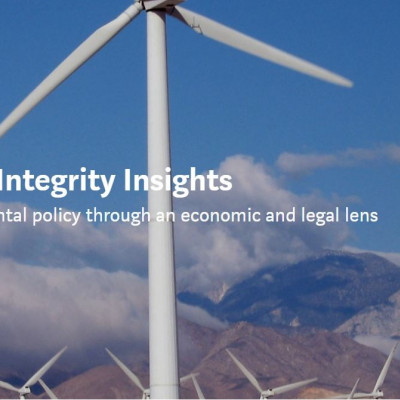December 31, 2021
December 2021 at Policy Integrity
- Debunking Myths About Federal Oil and Gas Leasing
- Trends in Public Acceptance of Energy Infrastructure
- Insurance Markets Meet Climate Change
- What Does the Infrastructure Investment and Jobs Act Mean for Transmission Siting?
- In the News: Climate Lawsuit, Clean Postal Trucks
- Policy Integrity Has a Blog!
- More From This Month
-

Debunking Myths About Federal Oil and Gas Leasing
According to fossil fuel lobbyists (and some problematic government models), reducing oil and gas extraction on U.S. public lands would not reduce emissions because the same level of extraction would simply occur elsewhere. But, in reality, research shows that this “substitution” effect is only about 50 percent, explain Peter Howard and Max Sarinsky. As they discuss, reduced federal leasing would indeed have major climate benefits.
Another myth: The Biden administration claims it was legally obligated to move forward with a major lease sale after a federal judge in Louisiana held that the government hadn’t taken the required steps to pause new leases. But the Louisiana opinion “doesn’t force the administration to move forward with any particular lease sale – the Department of Interior still has discretion over that,” Max Sarinsky told the Guardian.
-

Trends in Public Acceptance of Energy Infrastructure
Community acceptance is key to advancing energy infrastructure for a decarbonized economy, from renewable generation to transmission lines. But such projects are often contentious. Together with the Environmental Defense Fund, Policy Integrity co-organized a webinar on public acceptance and conflicts related to new energy projects and policies. Researchers funded by the Alfred P. Sloan Foundation and practitioners shared takeaways from their work, from the types of projects that generated the most conflict to the differences in conflict levels across communities. For more insights, you can watch the recording here.
-

Insurance Markets Meet Climate Change
Natural disasters have cost the United States more than $600 billion over the past five years. Insurers face climate change risks as both underwriters and as large institutional investors. Climate change transforms the underlying risk of insurance policies and investments alike, threatening insurers’ business model and creating default risk that would harm policyholders, writes Bridget Pals in a Hill opinion piece. Requiring insurers to identify and disclose the climate risk in their investment portfolios is a necessary first step. More detailed recommendations are available in Policy Integrity’s comments to the Federal Insurance Office.
-

What Does the Infrastructure Investment and Jobs Act Mean for Transmission Siting?
A new policy brief by Justin Gundlach examines what the new reforms in the Infrastructure Investment and Jobs Act (IIJA) mean for transmission siting. The brief highlights key implications for federal agencies’ efforts to expand interstate transmission capacity and notes how more a more ambitious bill would approach the issue.
-

In the News: Climate Lawsuit, Clean Postal Trucks
A lawsuit brought by Louisiana Attorney General Jeff Landry seeks to prevent federal agencies from considering scientific estimates of climate change impacts using the social cost of carbon. Richard Revesz and Max Sarinsky break down the implications of the case in a Bloomberg Law Insight, writing that while Landry’s lawsuit is cloaked in hyperbole about federal takeovers and taxes, the real threat lies in the case’s attempt to upset settled, bipartisan principles of administrative law.
In a POLITICO opinion piece, Andrew Stawasz makes the case for the Postal Service going electric. Buying zero-emission mail trucks would help combat climate change and local pollution in overburdened communities — and all of the Postal Service’s competitors are doing it. President Biden’s executive order to phase out fossil fuel-powered federal vehicles and buildings by 2050 is a “very significant” step in the right direction, because procurement rules can take effect almost immediately, Richard Revesz told the New York Times.
-
Policy Integrity Has a Blog!
We launched a new blog on Medium where staff will share their policy insights and discuss recent projects. The inaugural post by Lance Bowman lays out steps EPA can take to move forward on environmental justice. Sarah Ladin and Iliana Paul recommend ways that the Nuclear Regulatory Commission can improve equity in its siting and other decisions. Stay tuned for new posts (which you can always find by following us on Twitter and LinkedIn)!
-
More from December 2021
We submitted comments to:
- BOEM on the EIS for the proposed Cook inlet Lease Sale: BOEM proposes to lease over a million acres for oil and gas development despite estimating that it could lead to more than $1.3 billion in climate damages, and despite presenting no estimate of the economic benefits, against which these climate costs might be compared.
- BLM on its environmental assessments for lease sales in Colorado, Montana and North Dakota, New Mexico, Utah, and Wyoming.
- The Department of Labor supporting its revision of Trump-era restrictions on ESG investing by retirement plans.
- The Agency for Healthcare Research and Quality describing how the agency could integrate climate change and environmental justice considerations into its work.
- The Department of Health and Human Services supporting its proposed repeal of the SUNSET Rule, which retrospectively and prospectively established an "expiration date" for each of HHS's regulations.
Court filing: We filed an amicus brief in the U.S. Court of Appeals for the Tenth Circuit for a case challenging the Bureau of Land Management’s approval of over 300 drilling permits in New Mexico. Our brief explains why the agency’s consideration of climate impacts in its analysis of the project is deeply flawed.
New articles:
- In an article forthcoming in the Yale Journal on Regulation, Justin Gundlach and Michael Livermore examine and compare the social cost of carbon and marginal abatement cost-based analysis, clarifying the roles that these approaches to valuing emissions can and should play in climate policy.
- Forthcoming in the same issue of the Yale Journal on Regulation, an article by Jason Schwartz and Peter Howard argues that a declining discount rate framework can consistently harmonize agency practices and put agencies on sound legal footing in their approach to valuing the future.

